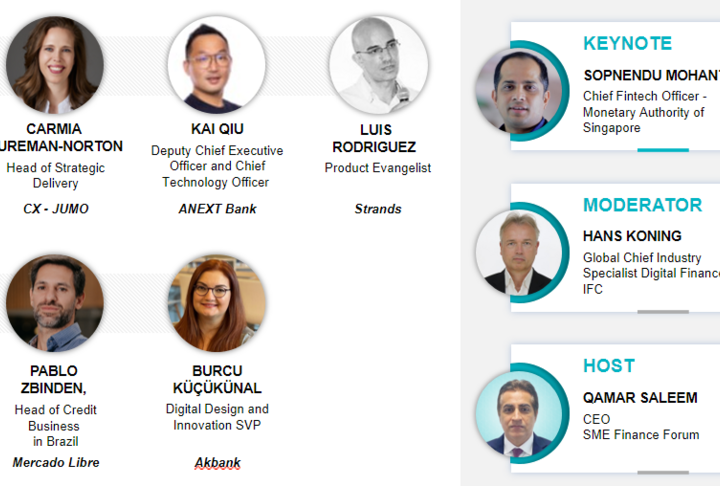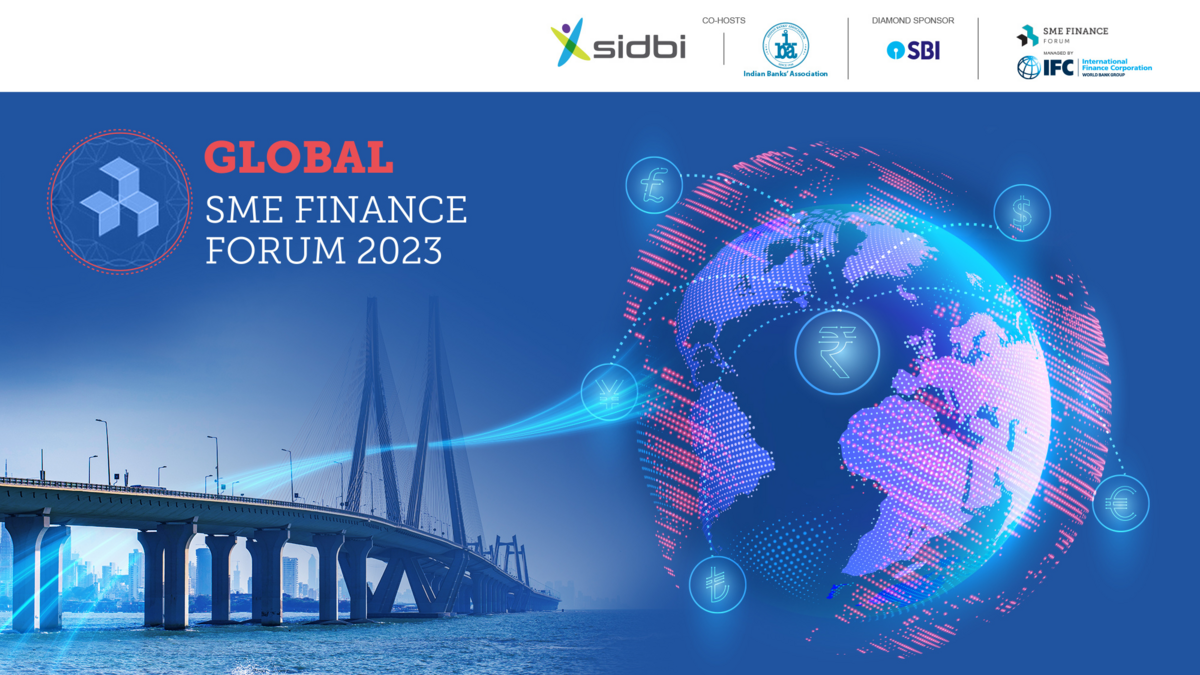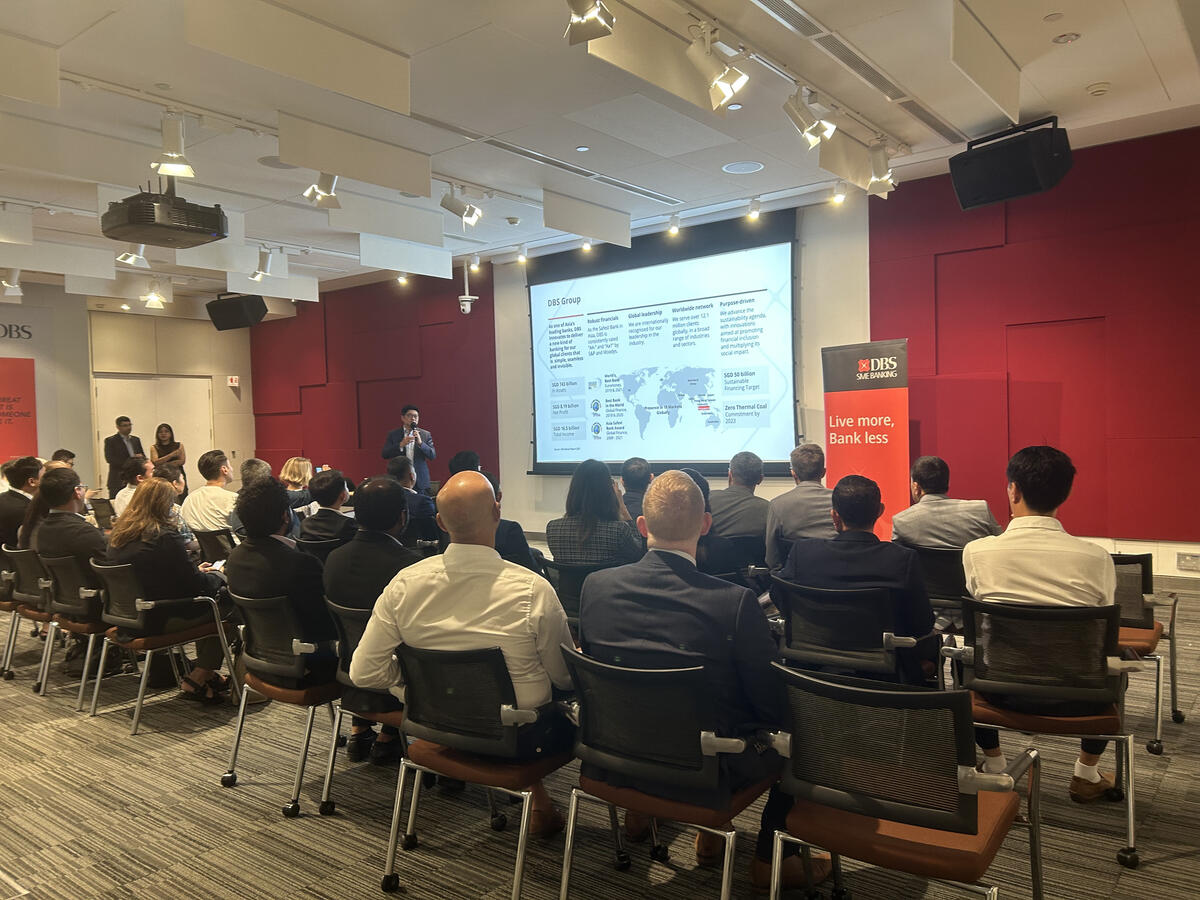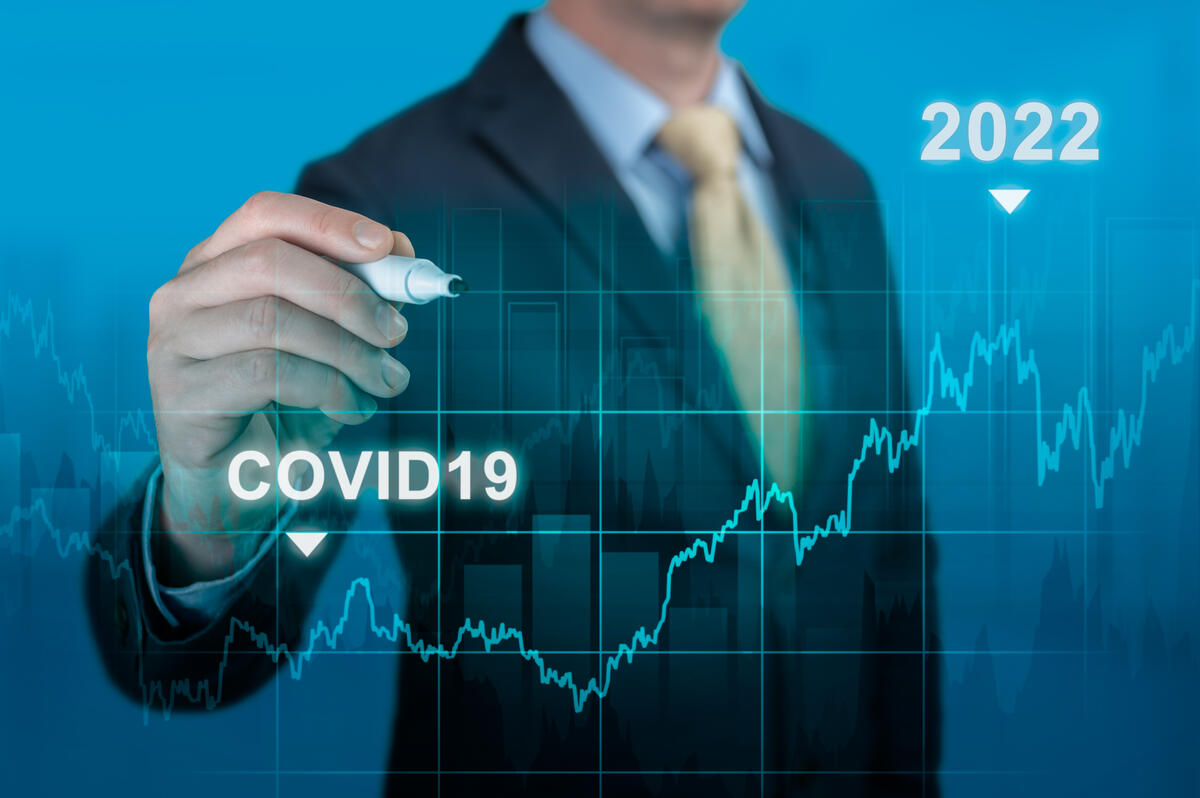Blog
SME Finance through the Lens of Investors

A virtual marketplace summary.
On January 12th, the Forum hosted a virtual marketplace featuring six leading investors in the industry to share their experience in SME finance. In this online session, Elizabeth Davrishashvili (FINCA Impact Finance), Luz Leyva (REGMIFA), Chris Wehbé (Lendable), Edmund Higenbottam (Verdant Capital), Ghassen Khelifi (IsDB), and Chloe Zhang (G5 Capital) presented their practices and innovations. The event was powered by GlobalLinker, an AI-driven ‘Digital Ecosystem’ offering SMEs a range of services to build digital presence in e-commerce.
Elizabeth Davrishashvili, the Global Lead of Customer Products and Solutions at FINCA, presents the financial services provider’s latest solution, Next Best Offer (NBO), which increases sales with data-driven management. In addition to a variety of SME products and services covering 19 countries, FINCA aims to further empower those people who lack funding to take control of their financial future and build their financial health. To achieve this goal, FINCA launched NBO, a highly Customer Centric solution, to explore its customers’ capabilities and boost its sales. The NBO guides the customers to the right product, services, and information promptly. With more than twenty years’ experience, FINCA has collected lots of valuable information about their customers. The NBO analyzes that data and suggests logical business decision-making driven by customer behavior. Currently, the Next Best Offer has been integrated into FINCA’s call centers and branches, allowing the bank employees to have a 360-degree view of the customers with knowledge from NBO’s descriptive, predictive, and prescriptive analyses. For the next step, FINCA plans to complete the digital sphere of the NBO ecosystem, including mobile banking, e-wallet, e-mail, and robocalls. Thus, the small business owners can acquire information about the most relevant products that they are eligible for through self-services.
Chloe Zhang from G5 Capital, the corporate venture capital of Jiangong Real Estate Group, introduces the company’s tech-driven investment approaches. Different from other CVCs in China, G5 Capital focuses on early-stage investments and aims to build a cross border ecosystem and community for investors and startups. Until now, G5 Capital has invested more than $30 million in over 30 startups globally, most of whom are related to property tech, smart city, IOT, smart building, and AI & robots. Thanks to its parent company’s significant global database, G5 has been a value-added co-investor to startups. It not only provides funds to the startups but also opportunities for growth and expansion. For instance, G5 Capital hosts various acceleration programs and events. Since 2020, G5 has been collaborating with MIT Technology Review China to host Smart Building Accelerator, which offers trainings and networking opportunities to the startups in property tech and smart city industries. In terms of partnership with local authorities, the company co-hosts a global competition with Hangzhou government to encourage innovations and startups in China. G5 UK is the new office launched in 2020, which co-invests with local accelerators and incubators to scaleup startups from Angel to series A round. Its accelerator program includes 6 months in Global Startup Hub, covering the landing service, workspace, and government grants.
Ghassen Khelifi, an Investment Specialist from the Islamic Development Bank, discusses the bank’s economic empowerment approach through fintech solutions. The multilateral development bank’s fintech ecosystem consists of six components: performance management, artificial intelligence, database, e-commerce and marketing platforms, capacity building and advisory platforms, and crowdfunding platforms. In 2021, IsDB started to utilize operational technologies to collect data, which empowers its core banking solutions, smart contract solutions, and project-based monitoring solutions. In 2022, the bank aims to achieve the second level of the ecosystem, in which it deploys artificial intelligence to analyze and process data, creates database for vendors, assets and pricing, and builds performance rating solutions. In 2023, the three types of platforms will officially ‘go to market.’ All components are closely linked to each other in IsDB’s fintech ecosystem, allowing the bank to leverage data and information in a more efficient way and upgrade its investment in small businesses.
Chris Wehbé, the CEO of Lendable, shares his experience investing capital in emerging and frontier market fintech companies and offering technology, asset management, and advisory services to leading investors. T. For Lendable, fintechs play an important role across emerging markets because they leverage digital methods of payments and create fundamentally new business models that offer tailored products to underbanked MSMEs and consumers. Different from the traditional cash payment, digital establishes track record inherently, which enables Lendable to use this data to access historical performance and monitor the ongoing book of a fintech originator in real time. Meanwhile, Lendable can act as a third party to verify data against bank or mobile wallet transactions. There are an estimated 131 million underbanked MSMEs across frontier and emerging markets, where fintechs are expanding rapidly to meet the demand. With its strength in data management, Lendable has analyzed over 61 million loans and established a proprietary database of 27 million unique loans across 25 countries and 5 market segments. Lendable fully integrates with the alternative lender’s loan management system to access granular and loan-level data for due diligence, data ingestion, and verification. Then the company uses machine learning tools to access the historical portfolio performance and make predictions and analyses. Finally, Lendable conducts ongoing review and monitors the portfolio performance in order to achieve long-term impact and offers fintechs grace period followed by amortization period, priced for risk-adjusted returns. In the future, Lendable plans to deepen its partnership with leading equity and debt investors and expand its activities in emerging markets.
Luz Leyva, the portfolio manager of the Regional MSME Investment Fund for Sub-Saharan Africa, presents how the social impact investment fund enables financial inclusion and fosters economic development through employment creation, income generation, and poverty alleviation across the region. KfW developed this initiative in collaboration with other Development Finance Institutions and Donor Governments. The Fund has a blended finance structure and supports institutions with both financial and non-financial services. Currently, REGMIFA serves financial intermediaries and possesses a loan portfolio of $147 million. The fund provides funding to financial intermediaries lending to small businesses with a variety of products, such as senior and subordinated loans, medium- and long-term investments, local currency loans, flexible ticket size, and providing technical assistance through a specialized facility. In 2020, the fund launched a new 10-year strategy, including increasing the share of portfolio dedicated to SME banks and SME financing, as well as diversifying investee profiles. The Investment Manager of the Fund since its creation is Symbiotics, an asset management company specialized in impact investing.
Edmund Higenbottam, the Managing Director of Verdant Capital, shares his insights into investing in inclusive financial institutions (IFI), including challenger banks and innovative credit institutions, in Africa and other low income and lower-middle income countries. Compared with private equity targeting larger transactions, Verdant Capital Hybrid Fund focuses on those around $4 – 20 million. In addition to retention of control for the investees, Verdant Capital neither dilutes equity nor demands valuation. And the structure of hybrid fund is comparatively flexible, which makes the investees more attractive to senior lenders. The pandemic has generated a greater need for the Hybrid Fund and brought opportunities for the fund to play a more critical role in inclusive financial institutions’ ongoing recovery from Covid. The top quartile IFIs have proven their robustness against immediate financial interruptions attributing to strong risk management as well as sufficient capital and liquidity buffers. In the meantime, these IFIs are expecting a sharp increase in demands for credits from MSMES that need to restock in the post-Covid era. By investing in IFIs, Verdant Capital encourages best practices and implementation of latest technologies to address the end-market opportunity. It offers new instruments to the investees’ respective local markets, thereby contributing to capital markets development. Hence, Verdant Capital realizes significant and sustainable development impact in the region. Its support for financial institutions improves funds for MSMES, job creation, rural and agricultural development, access to education and health, and renewable energy financing.
The virtual marketplace showcased the latest practices and solutions in the investment industry. In addition to providing funds and capital to the SMEs, the investors are interested in having a long-term and sustainable influence on the small businesses and local economy.

















